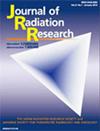保乳手术后左侧乳腺癌低分量放疗中的 VMAT 和 DIBH:非劣效性临床研究结果
IF 1.9
4区 医学
Q2 BIOLOGY
引用次数: 0
摘要
本研究的目的是在临床环境中展示容积调强弧形疗法(VMAT)与深吸气屏气(DIBH)在保乳手术后左侧乳腺癌低分量放疗中的安全性。这项前瞻性非劣效性研究共招募了25名日本女性,年龄在20-59岁之间,她们在DIBH条件下接受了VMAT,42.4 Gy/16次分次进行全乳房照射(WBI),同时对肿瘤床进行增强照射,以证明DIBH条件下的VMAT与传统的自由呼吸分次WBI相比没有劣效性。主要终点是放疗开始后 6 个月内 3 级或以上放射性皮炎或 2 级或以上肺炎的发生率。该研究的注册号为 UMIN00004321。所有入组患者都顺利完成了计划中的放疗。不良反应评估显示,3 名患者(12.0%)出现 2 级放射性皮炎。没有出现其他 2 级不良事件,也没有患者出现 3 级或以上不良事件。这些结果证实了我们的假设,即与历史结果相比,实验性治疗方法并无劣势。没有患者出现局部复发或转移。总之,在保乳手术后左侧乳腺癌的低分量放疗中,DIBH 条件下的 VMAT 可以在临床环境中安全实施。本文章由计算机程序翻译,如有差异,请以英文原文为准。
VMAT with DIBH in hypofractionated radiotherapy for left-sided breast cancer after breast-conserving surgery: results of a non-inferiority clinical study
The purpose of this study was to show the safety of volumetric modulated arc therapy (VMAT) with deep inspiration breath-hold (DIBH) in hypofractionated radiotherapy for left-sided breast cancer after breast-conserving surgery in a clinical setting. Twenty-five Japanese women, aged 20–59 years, who were enrolled in this prospective non-inferiority study received VMAT under the condition of DIBH with 42.4 Gy/16 fractions for whole-breast irradiation (WBI) ± boost irradiation for the tumor bed to show the non-inferiority of VMAT with DIBH to conventional fractionated WBI with free breathing. The primary endpoint was the rate of occurrence of radiation dermatitis of Grade 3 or higher or pneumonitis of Grade 2 or higher within 6 months after the start of radiotherapy. This study was registered with UMIN00004321. All of the enrolled patients completed the planned radiotherapy without interruption. The evaluation of adverse events showed that three patients (12.0%) had Grade 2 radiation dermatitis. There was no other Grade 2 adverse event and there was no patient with an adverse event of Grade 3 or higher. Those results confirmed our hypothesis that the experimental treatment method is non-inferior compared with our historical results. There was no patient with locoregional recurrence or metastases. In conclusion, VMAT under the condition of DIBH in hypofractionated radiotherapy for left-sided breast cancer after breast-conserving surgery can be performed safely in a clinical setting.
求助全文
通过发布文献求助,成功后即可免费获取论文全文。
去求助
来源期刊
CiteScore
3.60
自引率
5.00%
发文量
86
审稿时长
4-8 weeks
期刊介绍:
The Journal of Radiation Research (JRR) is an official journal of The Japanese Radiation Research Society (JRRS), and the Japanese Society for Radiation Oncology (JASTRO).
Since its launch in 1960 as the official journal of the JRRS, the journal has published scientific articles in radiation science in biology, chemistry, physics, epidemiology, and environmental sciences. JRR broadened its scope to include oncology in 2009, when JASTRO partnered with the JRRS to publish the journal.
Articles considered fall into two broad categories:
Oncology & Medicine - including all aspects of research with patients that impacts on the treatment of cancer using radiation. Papers which cover related radiation therapies, radiation dosimetry, and those describing the basis for treatment methods including techniques, are also welcomed. Clinical case reports are not acceptable.
Radiation Research - basic science studies of radiation effects on livings in the area of physics, chemistry, biology, epidemiology and environmental sciences.
Please be advised that JRR does not accept any papers of pure physics or chemistry.
The journal is bimonthly, and is edited and published by the JRR Editorial Committee.

 求助内容:
求助内容: 应助结果提醒方式:
应助结果提醒方式:


